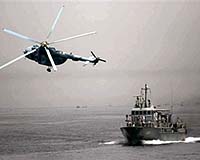 File image courtesy AFP. |
Tehran (UPI) Jul 30, 2009
Iran has deployed a flotilla of warships and support vessels into the Gulf of Aden, the second in recent weeks, and says it also plans to establish a new naval base in the Gulf of Oman, at the southern end of the chokepoint Strait of Hormuz.
This expanding naval activity by the Iranians may be intended to counter a recent increase in Israeli naval deployments. It also takes place against a backdrop of widening political turmoil in Tehran following the disputed re-election of hard-line President Mahmoud Ahmadinejad on June 12 that has caused international unease about what might ensue.
The naval units will replace an earlier flotilla dispatched by Tehran several weeks ago, ostensibly to help an international naval task force led by the United States to combat piracy off the coast of lawless Somalia.
However, the Iranian move followed the Israeli navy's deployment of one of its three German-built Dolphin-class submarines, believed to be capable of firing nuclear-armed cruise missiles, and two Saar 5-class missile corvettes from the Mediterranean through the Suez Canal and into the Red Sea in June and July.
That was widely seen as a message from Israel that it is capable of swiftly deploying naval forces into the Red Sea, which at its southern end joins the Gulf of Aden and the Arabian Sea, and that it, like the Americans, can strike from the sea.
Iran is widely believed to have been seeking naval bases in the southern Red Sea, across which Israel alleges it has been shipping weapons bound for Palestinian radicals of Hamas in the Gaza Strip via Sudan and Egypt.
The commander of Iran's navy, Rear Adm. Habibollah Sayyari, said on July 29 that Iran would stage a stronger presence in international waters off its southern coast "in a bid to maintain the country's might."
According to the semiofficial Fars news agency, Sayyari declared that Iran would conduct more naval operations in the Gulf in the near future.
He made the announcements during the inauguration ceremony of a new jetty for naval speedboats at the Jask naval base, on Iran's southern coast, and the opening of a new military air base there.
The expansion and fortification of naval facilities in the area had been ordered personally by Iran's supreme leader, Ayatollah Ali Khamenei, Sayyari said.
It is not clear to what extent these Iranian moves stemmed from the political infighting in Tehran or whether they were in response to the Israeli maneuvers.
But Iran's Islamic Revolutionary Guard Corps, which Khamenei put in charge of defending Iran in the Gulf, has been reinforcing naval facilities along the country's south coast for some months amid fears of possible U.S. or Israeli strikes against Iran's nuclear program.
Despite Israel's naval displays in recent weeks, its naval capabilities in terms of attacking Iran remain limited, because of the distances involved and the lack of sustainable firepower.
But the show of force underlined Israel's growing concern about Iran's nuclear activities and how it has overcome its earlier reluctance to risk sending any of its submarines through the Suez Canal where they could be highly vulnerable to attack.
The Israelis' use of the Suez Canal indicated Cairo's agreement, and it is likely that part of the message the warships delivered during their deployment was that Egypt, which also opposes Iran's nuclear power and expansionist policies, was prepared to ally itself with its former enemy against the Islamic Republic.
Egypt was incensed by clandestine efforts by Hezbollah, Tehran's Lebanese proxy, in setting up alleged terrorist cells inside Egypt and in aiding Hamas in the Gaza Strip, which borders Egypt's Sinai peninsula.
According to Egyptian authorities, the Hezbollah cells planned attacks on shipping in the canal, a strategic Egyptian asset.
Israeli defense expert Ron Ben-Yishai wrote on Israel's Ynet Web site that the deployment "attests to the improvement in Israel's and Egypt's strategic relationship."
"The Obama administration should note with satisfaction the passage of an Israeli submarine through the Suez Canal and see it as proof that its efforts to bring about regional cooperation to fend off the Iranian threat are beginning to bear fruit."





















